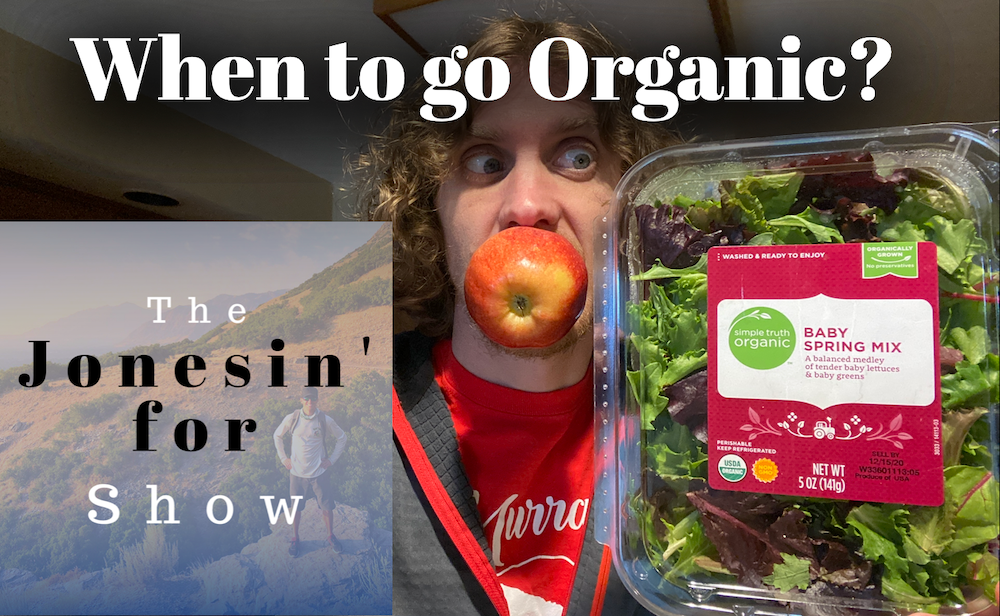When to Go Organic

When to Go Organic - Episode 59
Organic foods have become more available around the country and world. They have become slightly less expensive but are still out of reach for many people. If you want to make the most out of life you will want to keep your body happy and healthy. Eating natural and healthy foods is key to keeping your body healthy and ready to go. In this episode of the Jonesin’ for Show I breakdown what the organic label actually means and share when it’s better to go organic and when it’s not the worse thing to not get organic foods.

A label that is put on organic foods is “Certified Organic”. Most of the things that you see with this label are produce, meats, and things along those lines. However, that label can also be found on some cereals or other more processed foods. The USDA (the US Department of Agriculture) is the department that decides what foods can have the “Certified Organic” label. There are many strict guidelines that foods need to meet to obtain that label. You can find some of their guides on their website. https://www.usda.gov/media/blog/2012/03/22/organic-101-what-usda-organic-label-means
The first rule is the product needs to be produced without the excluded methods. On the website they have a list of methods that are ok and not ok. In order to get the label they cannot be produced with the methods that aren’t ok. One example of an excluded method is genetic engineering. Certified organic foods can not be genetically engineered. The second rule is the product needs to be produced with the allowed substances on the allowed national list. So it can’t have things like pesticides, again you can look at their website to see their list of what’s allowed. Lastly, all certified organic products are overseen by an agent of the USDA National Organic Program.

You might still be wondering what all of this means specifically, so I’ll try to break it down a little more. Firstly, products that are certified organic cannot be grown in soil that has had any prohibited substances such as pesticides and synthetic fertilizer applied to it in the past three years before the harvest. With meats, the animals have to be raised in living conditions that accommodate their natural behaviors. For example, if the animal would naturally graze in the wild, the animal has to be able to graze. Additionally, the animal needs to be fed 100% organic food. I believe that goes for dairy products as well.
Each produce product has a product code on it that consists of a few different numbers. These labels on organic foods are different than on conventionally grown foods. Conventionally grown foods will have a four-digit code on them, while organic foods will have a five-digit code that starts with a nine.

Now you might also see a product that says 100% organic. That means that all ingredients in it must be organic except for salt and water since they are considered natural. However, things that are just marked as organic does not mean that all of it is organic. When a product is labeled organic, it means that at least 95% of the ingredients are organic. Up to 5% of the ingredients may not actually be organic. One more label you may see is “made with organic foods” That means that 70% of the ingredients must be organic.
Now why is eating organic foods important? Conventionally made foods can be genetically engineered, grown with synthetic fertilizers and other things that are unnatural and kill other creatures. If these things are able to kill insects and other creatures, it could be killing us too. It could be killing our cells and good bacteria that our bodies need. Do you really want to eat foods that could be killing you? We want our bodies to run at top performance, and we could be inhibiting that by eating conventionally made foods.
.png)
One thing that stops a lot of people from eating organic foods is the cost. Organic foods can sometimes be double or even triple the cost of conventionally made foods. I found that there are foods that absorb more pesticides and other unnatural things than other foods. I want to share those with you so you know what you really should avoid. If you can go fully organic that would be incredible, and your body would love you for it! However, if you can’t, here are the things that I think are most important to buy organically: strawberries, spinach, nectarines, apples, grapes, peaches, pears, tomatoes, celery, and potatoes. These foods generally have more pesticides in them when grown conventionally. Foods that have a lower percentage of pesticides that are conventionally made and could be purchased are avocados, sweet corn, pineapples, broccoli, cauliflower, asparagus, kiwis, cantaloupe, and mangos.
Of course, all of this is up to you, but if you want your body to be the best it can be, natural and organic foods are the way to go. I understand that they are expensive, but in the long run I really do believe that it’s worth it! I would love to hear what you think about Going Organic! Please send me a message on social media at @Jonesinfor or email me at spencer@spencermjones.com.
.png)